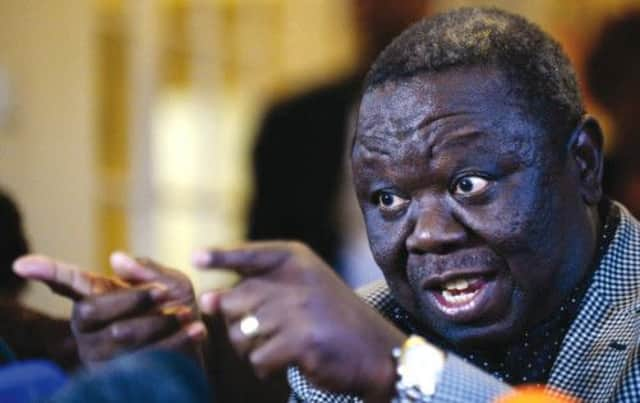Zimbabwe: Fraud claims as Mugabe sweeps to victory


Mugabe secured 61 per cent of the vote, against prime minister Morgan Tsvangirai’s 34 per cent.
Tsvangirai said yesterday he would challenge Mugabe’s election victory in court, as he rejected Mugabe’s Zanu-PF party win as a “fraud”.
Advertisement
Hide AdAdvertisement
Hide Ad“We are going to go to court, we are going to go to the AU [African Union], we are going to go to the SADC [Southern African Development Community],” Tsvangirai angrily told a news conference in Harare.
The MDC leader, who has been serving as prime minister in a fractious unity government under Mugabe, said his party totally rejected official results from Wednesday’s election showing Zanu-PF winning a massive landslide victory and gaining more than two thirds of seats in parliament.
“We did not lose this election. It is in the imagination of Zanu-PF that they won,” Tsvangirai said, adding that his party would present evidence in court to back its allegations that the 31 July vote was a “monumental fraud” engineered by Zanu-PF.
“I thought this election was going to resolve this political crisis,” Tsvangirai said.
“It has not. It has plunged the country back to where it was.”
The result of the election looks certain to extend 89-year-old Mugabe’s 33-year rule in the southern African nation.
Africa’s oldest leader, Mugabe has governed the former British colony, previously known as Rhodesia, since independence in 1980. The country has rich reserves of natural resources, including chrome, platinum, coal, gold and diamonds.
The European Union, which maintains sanctions on Mugabe and his senior aides, said it was concerned about “alleged irregularities and reports of incomplete participation” in the election.
Advertisement
Hide AdAdvertisement
Hide AdVoting last Wednesday passed off peacefully and received broad approval from African observers.
Tsvangirai has already called on the African Union and SADC to investigate the vote, calling it “null and void” and “not credible”. But he faces an uphill struggle to convince the regional bodies, as their observers have already publicly endorsed the election as free and peaceful, while acknowledging minor problems.
Adding to the controversy surrounding the election, one member of Zimbabwe’s nine-member Electoral Commission, Mkhululi Nyathi, has resigned since the vote, citing doubts about the integrity of the results.
Tsvangirai’s MDC said on Friday it could take to the streets to challenge Zanu-PF’s claim of a landslide victory, made less than 24 hours after the polls had closed on Wednesday.
Nyathi said he quit the nine-member Zimbabwe Electoral Commission (ZEC) over the way it managed the presidential and parliamentary vote held on Wednesday.
His resignation is likely to add to the dispute over the election both inside and outside Zimbabwe.
Western observers were kept out by Harare, and independent domestic monitors have described the vote as deeply flawed by registration problems that may have disenfranchised up to a million people. This includes the lack of availability of an updated voters’ roll, as required by law.
SADC observers have urged Tsvangirai to accept the result. They expressed relief that the elections have so far avoided the kind of violence that marred a disputed vote in 2008. Then, 200 MDC supporters were killed by Zanu-PF supporters.
Advertisement
Hide AdAdvertisement
Hide AdWestern rejection of the regional African verdict on the election could stir tensions with the continent. But acceptance of Mugabe’s victory will be criticised in countries that say he is a despot guilty of rights abuses and ruining the economy.
Britain, a sharp critic of Mugabe in the past, said it was concerned that Zimbabwe had not enacted important electoral reforms before the vote. The US government, which has imposed sanctions against Mugabe, said “a peaceful and orderly election day does not by itself guarantee a free and fair outcome”.